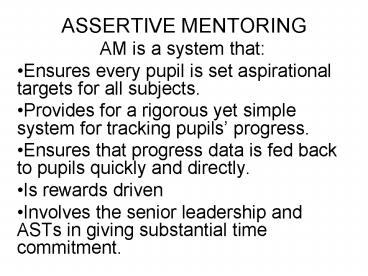ASSERTIVE MENTORING - PowerPoint PPT Presentation
1 / 8
Title: ASSERTIVE MENTORING
1
ASSERTIVE MENTORING
- AM is a system that
- Ensures every pupil is set aspirational targets
for all subjects. - Provides for a rigorous yet simple system for
tracking pupils progress. - Ensures that progress data is fed back to pupils
quickly and directly. - Is rewards driven
- Involves the senior leadership and ASTs in giving
substantial time commitment.
2
WHY ARE WE DOING IT?
- The potential benefits of mentoring are very
clear. It has the ability to - Remove current underachievement (CVA measures)
- Support all aspects of the pupils learning
- Remove conflict that may occur between teachers
and pupils - Act as a proactive measure given the schools
changing demographics - The most direct benefit of mentoring however, is
its ability when implemented effectively - to
support pupils to achieve their maximum academic
potential.
3
PROCESS KS4
- Upper school
- Targets are set at the start of Year 10
- Year 10
- Progress returns are made each month from January
on an Above, On or Below target basis (AOB). - This data is reviewed by the AMT who liaise with
HoDs and HoY/PAM in order to ensure that pupils
causing concern are monitored. Some may be
mentored if this is felt appropriate. - From May of Year 10 the year group begin the
Assertive Mentoring programme.
4
PROCESS KS4
- Year 11
- Each subject teacher provides Projected Grade
every month based upon current work and effort.
This is broken into 2 grades Overall grade
coursework grade. These grades are checked by
the HoD. - Grades are reviewed for all pupils. Pupils who
were previously identified as underachieving and
pupils with 3 or more grades below target are
then assertively mentored. Other pupils may be
seen by the HoY/PAM or individual HoDs. - Mentors meet with mentees to address issues and
monitor progress.
5
PROCESS KS4
- This cycle continues from October until May. In
addition to data return points, staff can also
refer pupils who are raising concern at any time.
These referrals will go to a specified mentor or
in cases where mentoring is not in place, the
referral will go to the HoY/PAM. They will then
liaise with the AMT. The system will have
capacity for adding these pupils if required.
6
PROCESS KS3
- Targets are set at the start of Year 7 by the
AMT. These targets are the end of Key Stage 3
targets. - Teaching staff then set the end of year targets
based upon this information. (Discussion may
need to take place over targets set.) - Years 78
- Progress returns (AOB) are made at the end of
Terms 1 and 2. - This data is reviewed by the AMT and liaison with
HoY takes place with a view to completing
parental interviews where necessary. - Final achievement levels are collected at the end
of Term 3. At this point targets may be reviewed
for the following year (Up not Down).
7
PROCESS KS3
- Year 9
- Progress returns (AOB) are made at the end of
Term 1. - This data is reviewed by the AMT and liaison with
HoY takes place with a view to completing
parental interviews where necessary. - In Term 2 projected levels are collected in
January-April. - These levels are reviewed and pupils causing
concern (as Year 11) are put onto the Assertive
Mentoring Programme until after the SATs.
8
HOW WILL THIS IMPACT ON STAFF?
- For all teaching staff
- Increased requirement to provide data on pupils
- Additional meeting time but with a focussed
agenda - Removal of confrontation with pupils who dont do
work required - Removal of data analysis pressures
- Teacher and pupil relationships are enhanced
- Rigour in the process gives pupils no way out
- Teachers focus remains in the classroom
- For HoDs
- Greater focus on monitoring pupils causing
concern within their area. - The additional data meetings will enable a clear
focus on progress within departments and as such
should remove these discussions from the usual
departmental meetings held once per half term.































